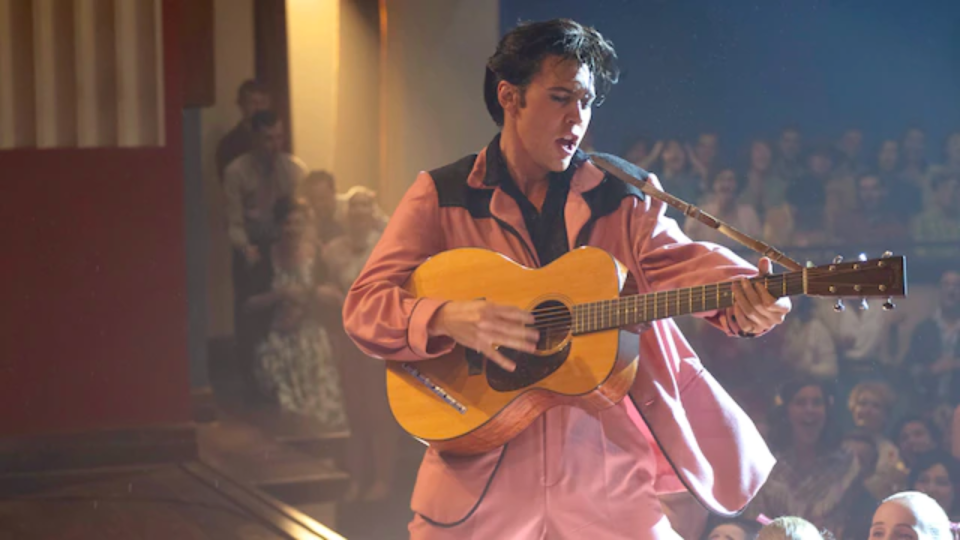'Elvis' movie shows the icon's contributions to music and to uniting America | Opinion
- Oops!Something went wrong.Please try again later.
With Baz Luhrmann’s film, "Elvis," racking up eight Oscar nominations, new generations are being introduced to the King of Rock n’ Roll. Elvis is back and this time it is not just a soundtrack in "Lilo & Stitch."
I was born just under three weeks after Elvis’ death. Though I was not fortunate enough to see Elvis in-person, the boy from Tupelo greatly impacted my life. It was my grandmother who first introduced me to Elvis, as she used to joke that we probably bumped souls up in heaven.
But from the moment I heard that voice, I was hooked; I could not get enough. Funny thing, though, the more I studied Elvis, the more the man, not the music, became the driving influence in my life.
Born in Tupelo, Elvis came up in a Deep South steeped in segregation and poverty. When you live in Mississippi during the Great Depression, the only color is green. As detailed in the 1981 television biography, "This Is Elvis," it was poverty that allowed Elvis to see his Black neighbor as individual and not an identity.
It was through this hardship that Elvis learned that there was no Black or white America – there was just one America. He learned that both races could live together, share experiences, and yes, share cultures.
Hear more Tennessee Voices: Get the weekly opinion newsletter for insightful and thought provoking columns.
Elvis' music is a testimony to his desire to be open to all
Make no mistake; even though he was dirt poor, he was still afforded opportunities his Black neighbor in Jim Crow Mississippi was not. Where Luhrmann accurately portrayed how a young Elvis was exposed to the spirit of Black Christianity, one must understand that the reverse experience was not available to his Black counterpart.

Elvis, though, made the most of his blessings and never forgot the sacrifices he endured, as well as those endured by those with a darker skin. His music is testimony to that fact.
Elvis’ raw talent fused Black and white cultures to give the world the gift of his music. Rock n’ roll would not have been rock n’ roll if it was just Black rhythm & blues and jazz. White country music completed the combustible recipe.
While some may claim that Elvis stole Black music, this is the opinion of revisionist historians. And, according to those who came up with Elvis, is wrong.
“Elvis didn’t steal any music from anyone,” blues legend B.B. King wrote in his autobiography, "Blues All Around Me." “He just had his own interpretation of the music he’d grown up on, same is true for everyone.”
Sign up for Latino Tennessee Voices newsletter:Read compelling stories for and with the Latino community in Tennessee.
Sign up for Black Tennessee Voices newsletter:Read compelling columns by Black writers from across Tennessee.
Elvis fused two cultures
By fusing two cultures, Elvis built the bridge that civil rights icons could walk across to reach the minds and hearts of a new generation of white Americans. Elvis’ music introduced a new way to a younger generation; a way that allowed them to challenge established notions of race relations.
It is this legacy that makes Elvis a key component in the nation’s fight for equality.
Remember, it was Elvis who faced the segregationist scorn in the '50s. Called a degenerate, charged with mainstreaming an "animalistic" culture, and mocked by the press, Elvis primed the next generation to march with Dr. King. Elvis was a white southern male in the 1950s who modeled integration for the whole world to see.

I like to think that, in part, Elvis’ example led me to become a civil rights lawyer and, later, a history teacher. From a very early age, Elvis showed me what the world could be like if we don’t limit our vision of the world to the color of our skin.
Now, with the Elvis renaissance, such a lesson will be handed down to a new generation of Americans at a time when it is so desperately needed.
Elvis is back in the building.
Joseph R. Murray II is a middle school educator, attorney and a former speechwriter for Patrick Buchanan. He is author of Take Back Education. He may be reached at jrm@joemurrayenterprises.com
This article originally appeared on Nashville Tennessean: 'Elvis' movie shows icon's contributions to music and American unity

